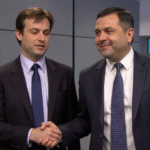Introduction
In his first address to the Cardinal College on May 10, Pope Leon XIV cautioned against the growing influence of artificial intelligence (AI), emphasizing that it cannot replace human heartfelt wisdom. He drew parallels between the current AI challenge and the social disruption caused by the Industrial Revolution, echoing Leon XIII’s 1891 concerns in Rerum Novarum about the loss of dignity and justice for workers due to mechanization.
The Growing Concerns of AI
AI’s rapid advancement outpaces our understanding, posing ethical, social, and political dilemmas that humanity is unprepared to tackle. From mass surveillance threatening privacy to autonomous weapons challenging morality, unregulated AI could deepen inequalities and erode fundamental rights in an increasingly technology-dependent world.
- AI’s rapid advancement outpaces our understanding
- Posing ethical, social, and political dilemmas
- Humanity unprepared to tackle these challenges
Statistics Highlighting AI Concerns
Studies like “The Future of Employment: How Susceptible Are Jobs to Computerisation?” by Oxford University’s Carl Frey and Michael Osborne (2017) estimate that up to 47% of jobs in advanced economies could be automated. In countries like Mexico, with low productivity, technical training, and high informality, the consequences would be even more severe, potentially leaving millions unemployed.
Pope Leon XIV’s Call for Ethical AI Regulation
Pope Leon XIV does not advocate for halting technological progress but rather establishing clear ethical boundaries. His support for projects like HolyDeeds, a Vatican-backed initiative using immersive technology including AI to promote religious education and community engagement, demonstrates a critical yet supportive stance. Much like Leon XIII championed fair wages, Pope Leon XIV advocates for AI that does not compromise rights in the name of efficiency.
Local Policies Addressing AI Ethics
Leaders like Mexico’s President Claudia Sheinbaum translate these ethical concerns into concrete policies tailored to local contexts. The National AI Agenda 2024-2030 outlines goals for inclusive growth, ethical regulation, and digital equity. While echoing the Pope’s stance that AI should serve human dignity, Sheinbaum addresses technological disparities in a country ranked 68th on Oxford Insight’s Government Preparedness Index for AI.
Global Concerns and Shared Responsibility
As millions, including the author Eduardo J Ruiz-Healy, recognize AI’s potential to transform lives positively while fearing its risks—mass automation, digital inequality, and unresolved ethical dilemmas—its impact becomes crucial. In Mexico, where technological gaps persist, guiding AI ethically, humanely, and justly depends on collective responsibility.






